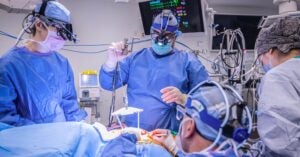Doctors successfully implanted a pig kidney into a critically ill New Jersey woman, complementing this with a groundbreaking procedure to stabilize her deteriorating heart.
Lisa Pisano faced a dire situation with both heart and kidney failure, making her ineligible for conventional transplants and running out of treatment options. However, the innovative medical team at NYU Langone Health formulated a unique strategy. First, they inserted a mechanical pump to sustain her heart function, followed by a kidney transplant from a genetically modified pig just days later.
According to NYU Langone Health, the 54-year-old patient is recovering well.
“All I want is the opportunity to have a better life,” she said. “After I was ruled out for a human transplant, I learned I didn’t have a lot of time left. My doctors thought there may be a chance I could be approved to receive a gene-edited pig kidney, so I discussed it with my family and my husband. He has been by my side throughout this ordeal and wants me to be better.”

To date, there have been no documented instances of anyone with a mechanical heart pump receiving an organ transplant of any kind. It is only the second transplant of a gene-edited pig kidney into a living person, and the first with the thymus combined.
“It is incredible to consider the scientific achievements that have led to our ability to save Lisa’s life and what we are endeavoring to do as a society for everyone in need of a lifesaving organ,” said Dr. Robert Montgomery, who led the transplant surgery and who is the H. Leon Pachter, MD, Professor of Surgery; chair of the Department of Surgery; and director of the NYU Langone Transplant Institute. “This could not have been done without the dedication and skill of the many talented physicians, researchers, nurses, health administrators, and perioperative care teams at NYU Langone Health, as well as the numerous pioneers who came before us.”
Almost 104,000 individuals are awaiting organ transplants, with 89,360 of them in need of a kidney. While approximately 808,000 people in the United States suffer from end-stage kidney disease, only around 27,000 received a transplant last year.
Two separate surgical teams performed the procedures over the course of nine days. In the first procedure, surgeons implanted a heart pump on April 4, 2024.
Then, the second procedure, a xenotransplant (transplant of an organ between different species), was completed on April 12.
According to NYU Langone Health, Pisano had high levels of harmful antibodies to human tissue but not to gene-edited pig organs. While it would have taken years to find a match for a human kidney, an investigational gene-edited pig kidney and pig thymus gland were available and matched.
“Without the possibility of a kidney transplant, she would not have been eligible as a candidate for an LVAD due to the high mortality in patients on dialysis with heart pumps,” said Dr. Moazami. “This unique approach is the first time in the world that LVAD surgery has been done on a dialysis patient with a subsequent plan to transplant a kidney. The measure for success is a chance at a better quality of life and to give Lisa more time to spend with her family.”
Pisano received a kidney from a genetically modified pig that doesn’t produce a specific sugar called alpha-gal. Previous research at NYU Langone showed that removing this sugar prevents the body from rejecting the organ right away. To further reduce the chance of rejection, the pig’s thymus gland, which helps train the immune system, was placed near the kidney. Together, the modified kidney and thymus tissue are called a UThymoKidney. United Therapeutics Corporation handled the gene editing, pig breeding, and creation of the UThymoKidney used in this procedure. No other unapproved devices or drugs were used.
“By using pigs with a single genetic modification, we can better understand the role one key stable change in the genome can have in making xenotransplantation a viable alternative,” said Dr. Montgomery. “Since these pigs can be bred and do not require cloning like more-complex gene edits, this is a sustainable, scalable solution to the organ shortage. If we want to start saving more lives quickly, using fewer modifications and medications will be the answer.”
»Related: Navy veteran receives second ever GM pig heart transplant

